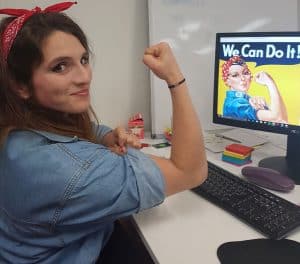
There aren’t many people on Earth that can wake up in the morning and say they love their job. However, 2016 afforded me the pleasure of being one of those people. I recently celebrated my one year work-a-versary with Yoghurt Digital, which allowed me to reflect on how far I’ve come as both a marketer and a person.
Before working at Yoghurt Digital, I was working as a marketing assistant in a financial services company and had been there for almost two years, with no digital marketing experience. After the year in an SEO role, I can comfortably say I’ve learned more in one year at work than I have in 3/4 years of my university marketing degree… Yay debt!
Upon joining Yoghurt Digital, I knew next to nothing about SEO and I realised that would have to change. VERY quickly. So I put my head down and learnt a lot about technical stuff (I occasionally bore people at uni with an unnecessarily detailed explanation as to why keyword stuffing is bad) and a whole lot more about working as an SEO Specialist – including what that meant.
Being an SEO Specialist means:
You love to read – A LOT
Reading in this case doesn’t mean picking up a technical book and reading it cover to cover (although you should probably do that too – I’m currently reading Don’t Make Me Think by Steve Krug). No, reading in this case means sitting down every day and reading a collection of articles about SEO and what happened overnight so you don’t fall behind the rest of the industry. This was actually one of the first things I learnt.
In fact, my first day at Yoghurt I spent three hours reading article after article, everything from the brand new AMP markup to, “What is a 301 redirect?”. If you do this, you’re usually ahead of the curve and as a result, so are your clients. My favourite SEO blogs include:

You like to fish
No, not like rod, reel and bait (although I do like that type too). Fishing refers to the practice of doing things yourself and not relying on a safety net, based off the saying, “Give a man a fish and he eats for a day. Teach a man to fish and he’ll eat for a lifetime”.
My fishing journey began when Matthew left the office to attend Mozcon – an SEO-focused conference run by the company Moz in the United States. That left me, a 6-month old SEO junior, the sole member of the SEO team at Yoghurt that could be contacted during the day. That was terrifying. But, looking back now, that month cast adrift helped me to learn that fishing is probably the only way that anyone gets anywhere. Without that safety net, I had to be extra confident in every decision I made.
The importance of digital marketing suddenly made sense to me. I relied on the Yoghurt team and a plethora of online sources to assist my decisions, eventually learning that I should fish or go hungry! All the knowledge you need is out there somewhere, it just comes down to throwing yourself into it.

You love testing your hypotheses
The cornerstone to any marketing role is testing your implementation via data analysis. Implementing and testing different out-of-the-box solutions that are based on data has enabled many of our clients to get ahead of the competition. Testing things that I’ve never done before (but was sure would work) was incredibly daunting. The first time I batch-uploaded redirects, I was uncertain whether or not they would make a difference, but everything I had read pointed me in their direction. Being able to test that hypothesis increased my confidence ten-fold. Having the space to do that in marketing is, as a result, super-important to me.
You can set realistic expectations
One of the hardest things for me to do before starting an SEO role was setting realistic expectations and being able to forecast time. We use a time management system called Toggl, which tracks time and activities. It can be integrated with Chrome to appear in places like Google Drive and Asana. The best thing about Toggl is the reporting feature. This enables us to review time spent on specific clients or tasks, giving us a pretty good idea of how long things take, where we can improve our time management skills and which clients are getting the least attention. I’ve definitely improved my ability to manage time and forecast capacity by using Toggl.

Setting realistic expectations also involves setting goals for clients. In a world of instant gratification, it’s easy to forget that SEO is not an overnight process – Google talked about this recently in their blog, “Do you need an SEO?”. The answer is yes, but it takes time.
Setting that expectation for your client is always a hard one, but setting that expectation for yourself as the practitioner is just as hard. Working for 20 hours a month for four months and not seeing a result can be disheartening, but just know, the results won’t come unless the work you’re putting in to set the foundation at the beginning is done correctly – and that takes time.
You know that even though others have more experience, your ideas still matter
With how quickly the SEO industry changes, your ideas can be more relevant than those belonging to someone with 30 years of experience. That’s definitely something I wish someone told me in my first three months… Being confident in your knowledge and what you read of other professional’s data analysis can help spark creative ideas to help your SEO strategy, as well as building your confidence when you’re starting out.
One of the most interesting things about working in a highly specialised team is that everyone has a different background with different stories and experiences. I know that as a university student, my experience supports things that may differ from Matt’s experiences, for example. Bringing these together creates a dynamic and widely-read team, which is definitely not a weakness.

To sum up
My first year as an SEO specialist was challenging in terms of learning how real marketing outside of university works, defining my life goals and fitting into and standing out in the work culture. I’m excited to see where my next year with Yoghurt takes me.